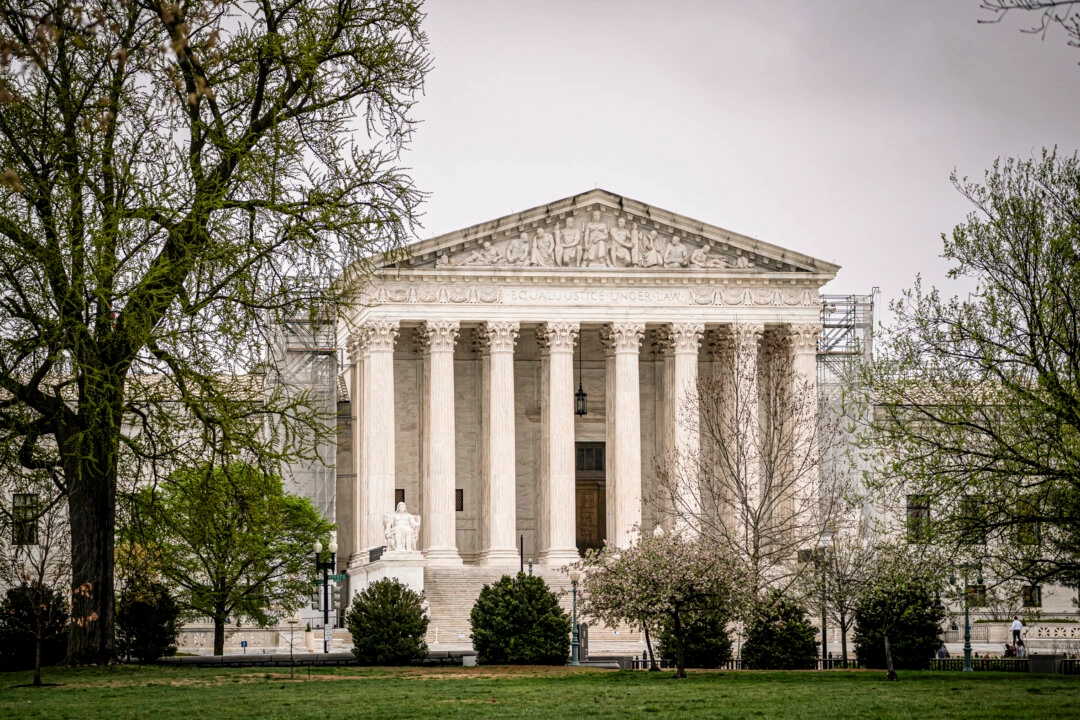The state claims a lower court’s decision to strike down the redistricting plan constitutes ‘a federal takeover’ of the state’s electoral system.
Louisiana officials asked the Supreme Court on May 10 to reinstate a congressional election map after a federal district court ruled upcoming elections may not be conducted under that map which created a second black-majority district.
Louisiana says the federal district court overstepped its authority and that if the map is not restored there will be “election chaos.” The state says there is no time to waste because it is required to adhere to a strict schedule to administer this year’s elections.
The Supreme Court could rule on the matter as soon as this upcoming week.
Attorneys for the state filed an emergency application with the nation’s highest court asking it to put on hold a 2–1 ruling from last month by a three-judge panel of the U.S. District Court for the Western District of Louisiana. The panel found that a map approved earlier this year by the state’s Republican-dominated legislature was unconstitutional racial gerrymandering that disfavored non-black voters.
The dispute grows out of the legislature-approved map that created a second majority-black district among the Pelican State’s six U.S. House of Representatives districts. Five of those six seats are now held by Republicans. Republicans occupy both U.S. Senate seats.
The map at issue was prepared after a U.S. district judge in a different case ordered the creation of a second black-majority congressional district to comport with Section 2 of the federal Voting Rights Act. Section 2 prohibits voting practices or procedures that discriminate on the basis of race, color, or membership in a large language minority group.
The redistricting plan that the legislature approved in 2022 after the 2020 Census provided for five white-majority districts and one black-majority district, even though about a third of Louisiana’s population is black.
But the new map featuring two black-majority districts was criticized by a group of Louisiana voters who described themselves as “non-African American.” They said the map “engaged in explicit, racial segregation of voters.”
The panel of judges in the Western District of Louisiana agreed with the non-black voters that the electoral map was constitutionally suspect and ruled it could not be used. That court set a June 3 deadline for the map to be revised by the legislature, failing which it will draft its own map. The state asked that court to stay its injunction pending appeal but last week it refused to do so.
Whatever decision the Supreme Court ultimately makes in this case could have nationwide political ramifications given Republicans’ razor-thin majority in the U.S. House of Representatives. Louisiana is home to Speaker Mike Johnson and House Majority Leader Steve Scalise, both Republicans.
Justice Alito ordered the respondents in both applications to respond to the respective applications by 11 a.m. on May 13.
In the new application, the state asked the Supreme Court to stay the order of the U.S. District Court for the Western District of Louisiana not later than May 15. The state said the matter is urgent because it has to follow rigid protocols to keep this year’s upcoming elections on track.
The state invoked the so-called Purcell principle, which holds that federal district courts ordinarily should not enjoin state election laws close to an election.
“‘Late judicial tinkering’ is a recipe for disaster,” and in cases like this the party seeking the electoral change bears an especially heavy burden to “overcome the State’s extraordinarily strong interest in avoiding late, judicially imposed changes to its election laws and procedures,” the application states.
Under the Purcell principle, the party seeking an electoral change must show it has a clear-cut case, that it would suffer harm in the absence of an injunction, that it has not delayed going to court, and that the changes sought “are at least feasible without significant cost, confusion, or hardship.”
“These principles overwhelmingly cut in favor of a stay here,” the application continues.
The district court panel’s current injunction and planned overhaul of Louisiana’s congressional map is not “feasible without significant cost, confusion, or hardship,” and these factors by themselves point to irreparable harm to the state. Nor are the merits of the case “entirely clear-cut in favor of the plaintiff.”
There is a “reasonable probability” that the Supreme Court will find it has jurisdiction in the case and “a fair prospect that it will reverse,” according to the application.
A stay of the panel’s injunction is justified because the district court has thrown out the state’s map and election timeline and ignored the secretary of state’s “pleas for a map by May 15 to avoid election chaos and confusion.”
This is not mere “tinkering,” and constitutes “a federal takeover, without even a gesture at judicial modesty or elementary federalism principles.” The panel “had no legitimate justification to assume the role of Secretary of State” and unless the Supreme Court acts “Louisiana’s 2024 congressional elections will be in disarray,” the application states.
Meanwhile, the Supreme Court is deliberating a challenge to the electoral map in South Carolina.
Republican state lawmakers told the Supreme Court it should overturn a ruling that the South Carolina legislature racially gerrymandered a congressional district because lawmakers used political, not racial, data to justify the redrawn map.
The Supreme Court frowns on racial gerrymanders, treating them as constitutionally suspect, but has adopted a hands-off attitude toward partisan gerrymanders.
The congressional seat at issue is currently held by Rep. Nancy Mace (R-S.C.). Republicans outnumber Democrats in the state’s delegation to the U.S. House by six to one. Both of the state’s U.S. senators are Republicans.
A decision in the case is expected by the end of June, though it could come sooner.
